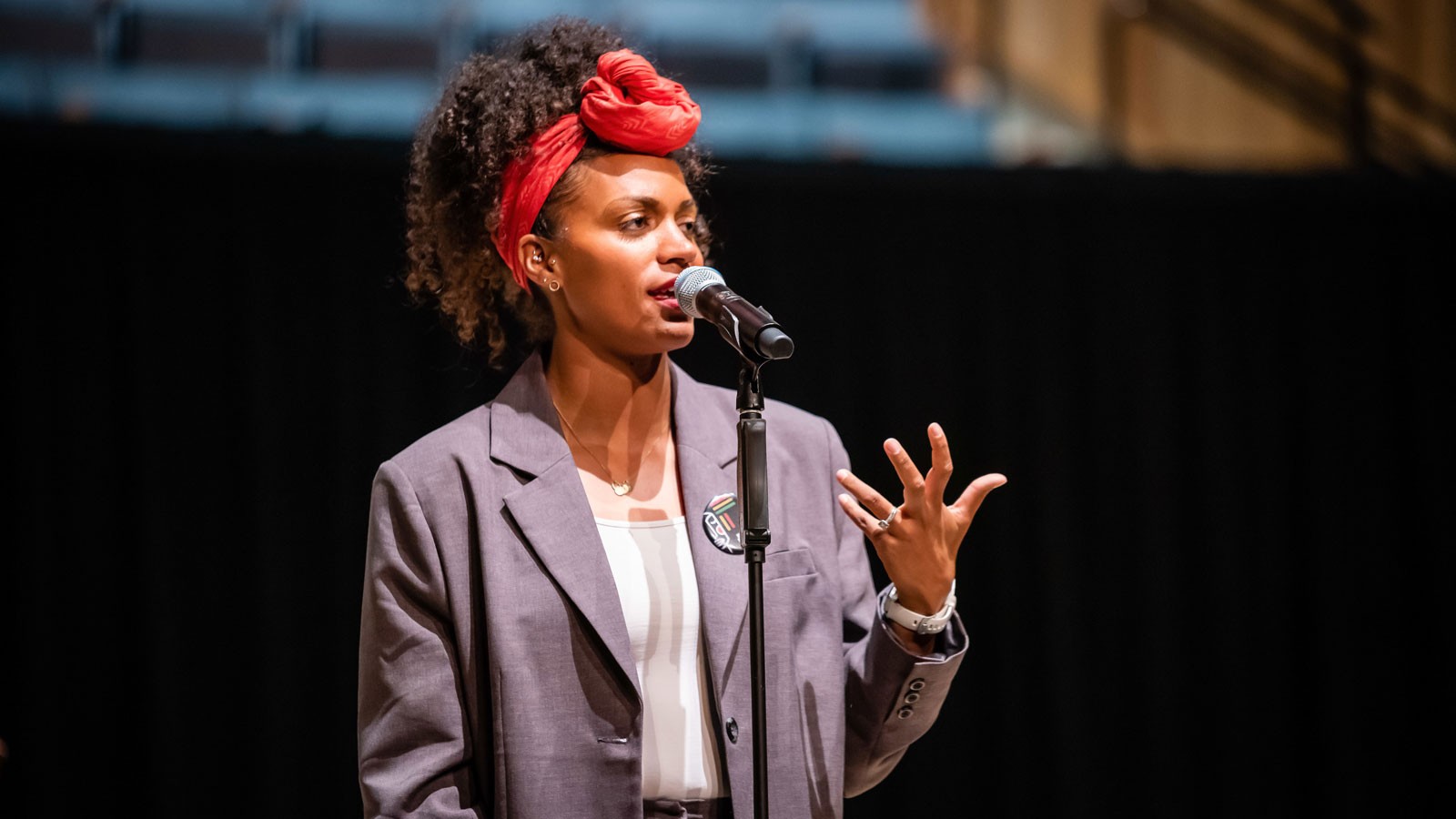Aggie Profile: Cree Taylor Encourages Students to Share Their Stories
By Tim Olsen |
Cree Taylor speaks at a 2023 Juneteenth event on the USU Logan campus.
Editor’s Note: As part of a series commemorating cultural heritages, Utah State Today is publishing interviews with a variety of Aggie alumni, faculty, staff and students. This interview with Cree Taylor, a faculty member of the College of Humanities & Social Sciences, is in observation of February as Black History Month.
In addition to working with her spouse to raise four young children, Cree Taylor is a lecturer at Utah State University.
Her classroom is informed by social constructivism, critical race theory, feminism, Black feminist thought, and pedagogies of care. She works to employ an engaged pedagogy and to establish her classroom as a brave space where students feel empowered to share their own perspectives and have those perspectives challenged in respectful and meaningful ways.
Taylor loves mentoring students and has a special interest in working with BIPOC students. Her favorite part about working with students is engaging with them on controversial topics and texts and helping them develop critical thinking skills.
UST: Tell us about your leadership journey and where you are today in your field.
CT: From a very early age, I had a knack for seeing things as I thought they should be and then "strongly encouraging" folks to act accordingly. This earned me the childhood nickname of DOT — Director of Traffic.
I was one of about five Black students in my entire high school, and I learned early on that I was always going to stand out and that my skills as a critical thinker and leader were going to be useful to me. I had to advocate for myself and put myself in places where I could speak out and encourage folks to be more welcoming.
Today, I stand out as a leader at USU where I serve as a lecturer in the English Department, a Black Student Union faculty adviser, and as an inclusion specialist in the College of Humanities & Social Sciences.
UST: What did you study at USU and how did your time as an Aggie prepare you for what you do now?
CT: I graduated from USU in 2014 with my BS in English teaching and in 2020 with my MS in English — literature & writing. My time as an Aggie helped me develop a better understanding of the importance of belonging and understanding issues through multiple perspectives.
There are a lot of underrepresented students at USU who do not feel like they are truly part of the Aggie family, and I recognized that I could use my skills as a leader, communicator and educator to help advocate for folks on the margins.
In my roles at USU, I apply inclusive teaching practices to help enhance opportunities for all students to be successful and I work to help USU be a more welcoming place for all students, faculty and staff.
UST: Who were your biggest mentors at USU and how did they impact your life and career path?
CT: I had a few really amazing mentors at USU. The first one being Dr. Ross Peterson. He taught a Civil Rights Movement course that I took as an undergraduate, and he helped me learn how to interact with and dialogue with folks from a variety of backgrounds.
I would also credit my track and field coach, Yogi Teevens, who taught me a lot about hard work and passion. She helped me continue to develop my love for track and field and improve as a student-athlete.
Dr. Lezlie Christiansen-Branum has been influential in my undergraduate, graduate and professional work as a teaching and learning mentor. She helped me develop my love for excellent teaching as a student and continues to help me foster that love today.
UST: How has your experience as an African American leader shaped your journey?
CT: I think my experience as an African American leader has been uniquely shaped by the environments and societies in which I live. I already had innate leadership characteristics from a young age, but growing up and working in predominantly White spaces has required me to use those skills as a leader differently.
I am almost expected to adopt the role of leader in these spaces because I am a Black woman — that comes with its blessings and challenges. I feel like it is my responsibility to step into roles as an "African American" leader to advocate for my students and coworkers who may not feel empowered to speak up.
I am grateful for the support of folks from a variety of backgrounds who care about and are involved in the work.
UST: What advice would you give to the next generation of aspiring Aggie leaders and/or students who are just starting out?
CT: Find your people. Don't be afraid to join a student group or club based off your identity. There are folks at USU who are actively working to make sure you are supported, uplifted, and that you feel like you belong.
Never be afraid to use your voice. Develop mentoring relationships with your instructors and use their connections to help you succeed. Leadership, standing out and being loud is challenging and sometimes painful, but your voice and perspectives are needed.
People need to hear your story. Don't be afraid to share it.
WRITER
Tim Olsen
Managing Editor
Utah State Magazine
435-797-1769
timothy.olsen@usu.edu
CONTACT
Cree Taylor
Special Assistant to the Dean for Diversity, Equity and Inclusion
College of Humanities and Social Sciences
cree.taylor@usu.edu
TOPICS
Society 504stories Community 446stories Diversity & Inclusion 252stories History 139stories Aggies 134stories Humanities 117stories Culture 75storiesComments and questions regarding this article may be directed to the contact person listed on this page.







